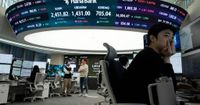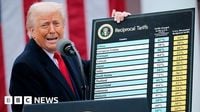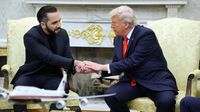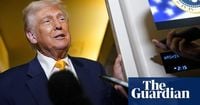On April 14, 2025, world markets experienced a significant rally following comments made by U.S. President Donald Trump regarding tariffs on electronics. Trump announced that products such as smartphones, computers, and laptops would not be subjected to the same import duties as other goods, which provided a boost to technology stocks. In early European trading, Germany’s DAX surged by 2.4 percent to reach 20,857.54, while France's CAC 40 climbed 2 percent to 7,245.28. The FTSE 100 in Britain added 1.8 percent to close at 8,104.83. Futures for the S&P 500 and Dow Jones Industrial Average rose by 1.2 percent and 0.9 percent, respectively.
Asian markets also saw gains, with Japan’s Nikkei 225 increasing by 1.2 percent to 33,982.36 and South Korea’s Kospi climbing 1 percent to 2,455.89. Technology shares were particularly strong; for example, Tokyo Electron rose by 1.4 percent, while Advantest, a maker of testing equipment, jumped 4.9 percent. In South Korea, Samsung Electronics gained 1.8 percent, reflecting the positive sentiment in the tech sector.
Trump's remarks came in response to escalating trade tensions with China, which had recently announced a dramatic increase in tariffs on U.S. products to 125 percent. The Chinese Ministry of Commerce described Trump's temporary exemption of certain electronics as “a small step” towards addressing what they termed wrongful reciprocal tariffs, urging him to completely cancel them.
In a twist of events, Trump indicated that while electronics might be temporarily exempt from certain tariffs, they would be subject to a new semiconductor tariff, which he plans to detail soon. "We need our medicines and we need semiconductors and our electronics to be built in America," said U.S. Commerce Secretary Howard Lutnick.
Despite the temporary reprieve for electronics, the uncertainty surrounding tariffs has caused significant disruption. A Brampton, Ontario-based company, Taurus Craco Machinery, reported a loss of nearly $35,000 due to the abrupt changes in tariff policy. The company rushed to ship products to U.S. clients before the tariffs took effect on April 9, only to find their shipment delayed by minutes. This led to customs charges that they could not pass on to their clients, as sales had already been negotiated.
Wes Love, the owner and CEO of Taurus Craco, expressed his frustration, stating, "It’s just a heartbreaking situation for us when we played by the rules and did everything right in order to try to maintain some, you know, level of incoming revenue." Experts have noted that the chaotic nature of Trump’s tariff policies has made it increasingly difficult for businesses to plan and adapt, with many small business owners struggling to keep up with the rapid changes.
As the situation unfolds, the impact of Trump’s tariff policies continues to ripple through the global economy. The yield on the 10-year Treasury bond was trading at 4.44 percent on April 14, reflecting investor concerns over the trade war's implications. Just days prior, the yield had peaked at 4.58 percent, indicating market volatility.
In the context of these developments, investors are wary of the potential for a global recession as a result of the ongoing trade disputes. Billionaire investor Ray Dalio warned that the U.S. might face “something worse than a recession” due to Trump’s trade policies. Meanwhile, the Federal Reserve is closely monitoring inflation, which may rise as tariffs take effect, potentially complicating monetary policy.
On the political front, Trump has faced criticism for his handling of the tariff situation. He has been accused of using tariffs as a negotiating tactic, claiming that they are necessary to rectify unfair trade practices. However, the unpredictable nature of these policies has led to significant fluctuations in the stock market and raised fears of a decrease in global trade.
In response to the ongoing turmoil, U.S. Trade Representative Jamieson Greer confirmed that there are currently no plans for Trump to engage in dialogue with Chinese President Xi Jinping. This lack of communication may further exacerbate tensions between the two nations.
As the world watches the unfolding drama surrounding tariffs and trade, one thing is clear: the stakes are high, and the implications of these policies will be felt far beyond the United States. The global economy stands at a crossroads, with businesses and investors alike grappling with the uncertainty that Trump's tariff policies have created.
Looking ahead, the upcoming announcements regarding semiconductor tariffs and other trade measures will be crucial in determining the trajectory of U.S.-China relations and the broader economic landscape. As Trump prepares to unveil more details, the world awaits with bated breath, hoping for a resolution that will stabilize markets and restore confidence.








